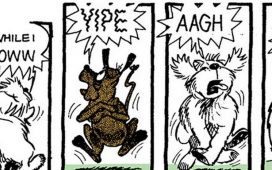Even if you don’t watch Question Time, you probably saw Rachel Boyle’s heated interaction with Laurence Fox.
The clip went viral, amassing thousands of likes and retweets and catapulting the former actor to a moment of infamy.
The clash was about Meghan Markle. Laurence Fox said Markle hadn’t been subject to racism, that the accusations of racism were ‘boring’, and then said Rachel herself was racist for saying he was a ‘white, privileged man.’
Rachel called him out on every point, and the interaction blew up. People were passionate – on both sides of the debate – and the university lecturer saw her Twitter follower count rocket to more than 20,000, practically overnight.
But, after the initial media storm dies down and those clips stop popping up on the timeline, what is it actually like to go viral for calling out racism on national TV as a black mixed-race woman in the UK?
When we spoke to Rachel, she told us she was receiving death threats – the latest one had landed on her desk just the day before. It isn’t easy, but she’s defiant in the face of hatred.
‘It has been a mixed bag this week if I’m being honest,’ Rachel tells Metro.co.uk.
‘I’ve had numerous negative responses, but the fact that this threat was in hard copy and actually found its way into my hands was a little bit scary. The police are involved.
She says the response has been one extreme to the other – both incredibly supportive and incredibly abusive. But when we asked her if she regrets speaking out, she laughs.
‘Categorically no. Absolutely not,’ she says, firmly.
‘In one way, I am exhausted, and I want to take a big lie down. But equally so, I am fired up. I’m honoured to be in this position.’
Rachel has a painting above her desk in her office, and every time she looks at it she is reminded why she needs to find the energy to keep fighting.
The painting depicts a black female slave with her daughter – who is about to be sold at auction. Oprah Winfrey has the original in her house and says it’s a reminder that at any point she could have been that helpless mother or terrified daughter.
‘Ten minutes ago that was us,’ says Rachel. ‘Ten minutes ago, my family were in fields picking cotton and harvesting sugar.
‘If I, even for a moment, become tired, or become upset, or have any negative feeling about this journey – I remember that. That’s why I’m here.
‘My ancestors were in fields dreaming of this moment. And I have a duty. Yes, it’s a big one, but that is essentially what I came to do.’
Amidst the hate and the trolling, Rachel is so appreciative of the people she has been able to connect with off the back of her viral altercation.
One technique she has for not allowing the negativity to get to her is to take a really practical, quantitative perspective.
‘I printed off all of the negative emails, and then I went back and looked at all of the positive ones – and there were double the amount of positive responses.’
In her job as a university lecturer, Rachel is conducting in-depth critical research into white privilege – specifically in education and teaching.
She says the reaction from people who don’t understand the concept of white privilege is always the same.
‘It’s anger and it’s defensiveness because they view the term as an insult,’ she explains. ‘But that’s ridiculous because they don’t understand what it means.
‘They automatically take it as if they have an unfair advantage and they don’t agree with it. They then feel the need to justify all of the things that have gone wrong in their lives.’
She says the key problem is that people don’t have the language to talk about racism. And it is this gap in knowledge that leads to unproductive conversations – like the one she had with Fox.
She says: ‘On Question Time I said the treatment of Meghan Markle in this country has been racist, and there was some show of support for that, people clapped.
‘The moment I mentioned white privilege – it was like, whoomph! It is a very explosive term for people who don’t understand it because they feel like it’s an attack.
‘When Laurence called me a racist, it showed me that he has a fundamental lack of understanding of what the term white privilege actually means.’
One of Rachel’s key concerns with platforms like Question Time is the distinct lack of balance. She was one of a handful of people of colour in that studio when the programme was recorded. She says you can’t effectively discuss racism in an environment like that.
‘There was nobody who was willing to contribute in a constructive way. And indeed, I wasn’t given the opportunity to do so,’ says Rachel.
‘Fiona Bruce said, and I quote, “I’m not taking sides, but Priti Patel said it wasn’t racist… so.”
‘The majority of the audience was against anything that I was saying. I counted three other black people in the audience. If we’re going to discuss these things, it needs to be done in a more equitable way.’
Rachel isn’t afraid of arguments and differences of opinion. Her entire job is to look at both sides of a debate critically and analyse them. But it was the carelessness of the discussion on Question Time that Rachel thinks makes it so damaging.
‘There was just no consideration,’ she says. ‘No time was taken [by Fox] to consider his position. Or to think about why my opinion may be different from his own, and listen to the reasons and the evidence behind that.’
What happened on Question Time is symptomatic of a much larger racial malaise that is gripping the entire country, says Rachel. She says that we are existing in a ‘perfect storm’ for racism.
‘The government’s Brexit seems to have changed the things that people have been allowed to say. Piers Morgan, for example,’ she says. ‘Years ago, maybe 10 years ago, that wouldn’t have been allowed. But there has been a shift towards the right.
‘Now, it’s okay to say racist things on television. It’s okay to mimic Chinese people in a derogatory fashion, and you’ll still have your job.
‘It’s okay for Laurence Fox to make ridiculous statements about Sikh soldiers in the film 1917 – that’s okay. There’s more tolerance for racism.’
Rachel adds that the MacPherson report, which was written as a direct result of the Stephen Lawrence inquiry in the 1990s, led to a move within public institutions to address racism in a way that we’ve never had before.
‘We had years of bliss where racism was not tolerated, it was not acceptable,’ she explains. ‘Institutions were acknowledging racism in order to then be able to dismantle it.’
But the Brexit movement, she says, has brought us backwards.
‘Social media has also been a huge influence in this,’ she says.
‘The “perfect storm” is the current political climate, the rhetoric around race, and the platform of social media on which to express it. It’s really scary, and, if I’m honest, it’s really quite depressing.’
In the weeks since her appearance on Question Time, Rachel has had to actively change her thought processes in order to keep positive and keep fighting.
‘I will think to myself; “yes it’s bad, but this is what we came to do. This is what we’re here for. This is the fight that you’ve been warming up for,”‘ she says.
‘My dad said to me – “you’ve been warming up for this since you were four years of age, I don’t know why you’re so surprised!”
And she isn’t surprised. Years of studying racial discrimination have shown her that this cyclical pattern of waning and waxing racism is entirely typical and expected.
‘Critical race theory says that all racial advancement will be clawed back. And that is absolutely what has happened,’ she explains.
Rachel uses the example of Barack Obama and his monumental inauguration. Rachel said she wept watching a black man being sworn in to the most powerful office in the world.
‘And what happens next?’ she asks. ‘Donald Trump.
‘It’s a really vulnerable time because people on the right and people with racist views are being allowed to express them, and there are no consequences.’
Going viral for calling out racism has lead to death threats for Rachel, and yet it is Laurence Fox who has pulled away from social media claiming that his mental health is suffering.
Rachel doesn’t have the privilege of being able to do this. The fight is too important for her. She knows it’s time to gather her strength for the fight of her lifetime.
Do you have a story to tell about an experience of racism?
Get in touch with the team: metrolifestyleteam@metro.co.uk.
The State of Racism

This series is an in-depth look at racism in the UK in 2020.
We aim to look at how, where and why racist attitudes and biases impact people of colour from all walks of life.
It’s vital to improve the language we have to talk about racism and start the difficult conversations about inequality.
We want to hear from you – if you have a personal story or experience of racism that you would like to share get in touch: metrolifestyleteam@metro.co.uk















